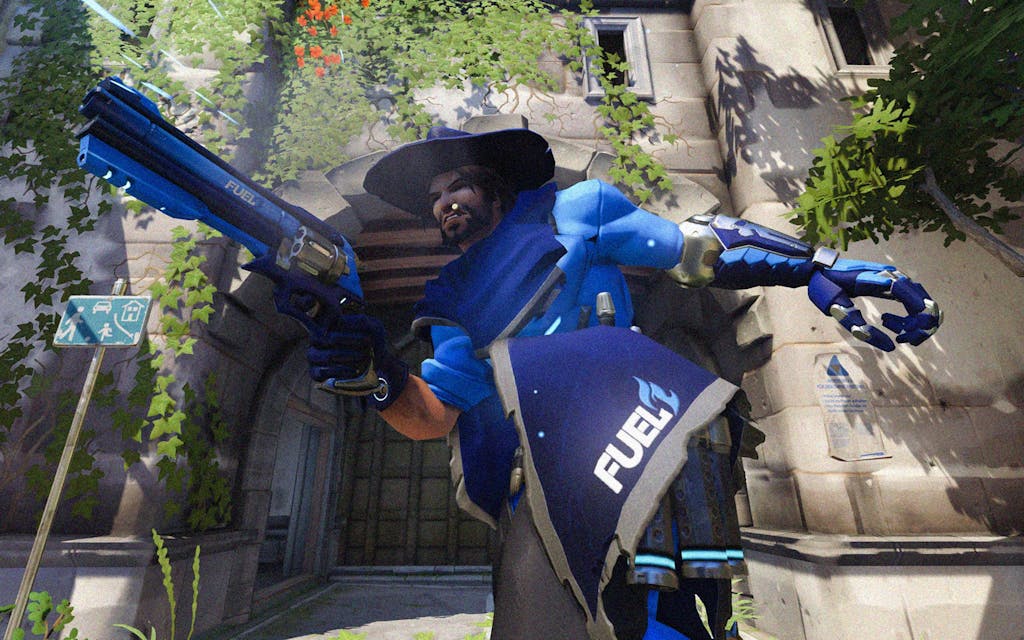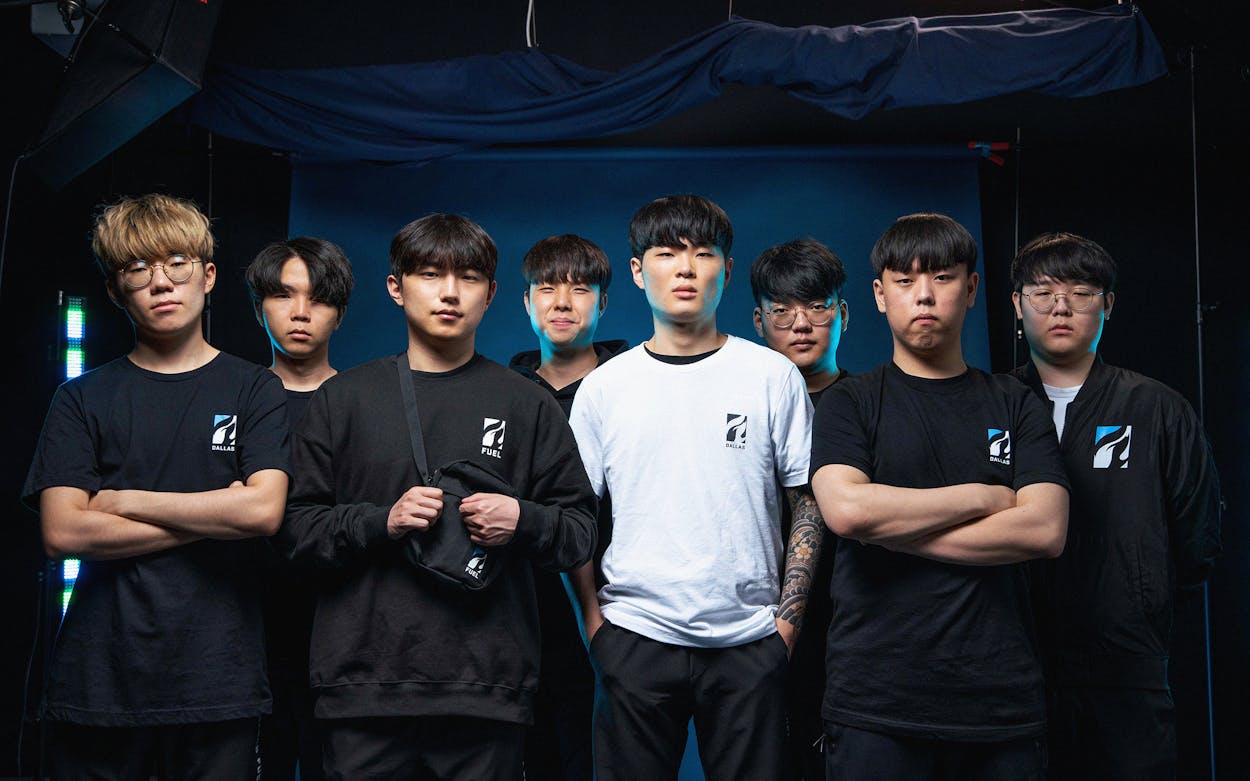Inside Dallas Fuel headquarters, eighteen-year-old Kim Yeong-han, better known to the gaming community as Sp9rk1e, lies on a sofa, watching a YouTube video of a worm being dissected. Mundane informational videos help him relax. His nineteen-year-old teammate, Choi “Hanbin” Han-been, careens down an adjacent hallway on a hoverboard. Meanwhile, Lee “Fearless” Eui-Seok and Kim “Doha” Dong-ha swat a ping-pong ball between them. The whole gang will probably raid one of the lounge’s three fridges before returning to their PCs for “scrimming” (scrimmages for their next match). “When it’s the entire group of them just hanging out together, it gets pretty rowdy,” says 27-year-old Helen Jang, the team’s translator and assistant general manager, who goes by her gaming handle, “Dear.”
The Fuel is an esports team owned by Envy Gaming, which employs dozens of professional players who compete in games like Call of Duty and Super Smash Bros., as well as streamers who develop content for Envy’s Twitch and YouTube channels. Founded in Dallas, the company’s corporate offices are located in Victory Park, an upscale mixed-use development downtown. The Fuel are one of twenty teams competing in a professional league for Overwatch, a first-person shooter game in which teams of six players work together to complete a goal against an opposing team.
Overwatch is played on maps, representing specific terrain such as a cityscape or neighborhood, and points are won by completing objectives while fighting enemy players. As with any sport, player profiles detail statistics, in this case damage per second or number of kills. Outside pro leagues, roughly 10 million amateur gamers around the world play Overwatch.
Overwatch League is the first esports organization to adopt a city-based franchise structure akin to traditional sports leagues like the NFL, the NBA, or MLB. Teams earn one point per win across sixteen regular-season matches, and can earn additional points by qualifying for in-season tournaments. The league’s minimum salary is $50,000, but star players earn upward of $150,000, plus bonuses.

The Dallas Fuel’s eight-person roster consists entirely of South Korean gamers, all but one of whom joined the team this year and arrived in Texas this spring. Dallas, home to the state’s largest Korean population (around 80,000), might seem to offer a comfortable adjustment to life in Texas, but the players felt some culture shock. Before moving to the state, Hanbin says he’d gotten the impression that Texas was “a dangerous place with guns.” But after a few months in Dallas, he says, “It’s really the same, not any different from New Jersey,” where he lived last year while playing for another team. “I was surprised by how big the supermarkets are here,” he adds. Doha expected Dallas to be hot, but quickly learned that “Texas weather just has a mind of its own.”
The team’s schedule of training and competitions hasn’t left the players much time to explore the city. “A pro gamer’s life is really all about practicing,” Hanbin explains. On a typical day, the team will receive a late-morning wake-up call and then walk five minutes from their apartments to Envy’s offices. Scrims and meetings begin at noon and last until around 8 p.m., but the players often stay later, training with their in-game characters and reviewing past matches until late at night. Pro gamers are accustomed to these long hours. Sp9rk1e, who has been gaming since he was five, remembers playing so much that his father, annoyed by the constant gaming in their home, sometimes banished him to play at a local internet cafe.
The Fuel’s players spend day and night together. Team meals are catered in the office twice daily, with local restaurants supplying familiar favorites like Korean fried chicken, spicy salted squid, and soy sauce crab. “I just really like meat,” Hanbin says, before admitting that he still hasn’t tasted Texas barbecue. “I really want to try, but I haven’t had an opportunity to go.” Of course, some meals simply can’t be replicated. Fearless says his family’s cooking is the thing he misses most about home. “They’re really good at making kimchi stew and army stew,” he explains, referring to budae jjigae, a dish made of processed American foods like Spam, Vienna sausages, and canned beans simmered in a spicy gochujang broth that became popular after the Korean War, as a result of the enduring U.S. military presence in South Korea.
Occasionally, the team finds time to slip away from the Envy campus to visit Carrollton, a suburb north of Dallas with a thriving K-town. “There are a lot of restaurants, cafes, salons,” says Sp9rk1e, “and it’s all together in one plaza, so it’s really easy to find what you need.” Dear often shops at the H Mart there, and can’t resist buying extra snacks for the players. Born in South Korea, she moved to Chicago in middle school and followed her love of gaming out of a career as a pharmacist and into her role with the Fuel. She says that Envy is “excellent at creating that space for players to be themselves and be close friends.”
But the players’ time in Dallas hasn’t been all idyllic strolls through Carrollton and horsing around in the office. Last month, amid a nationwide spike in violent assaults and reported hate crimes against Asian Americans, Fearless spoke out about racist attacks and harassment he had faced since moving to Texas. “Being Asian here is terrifying, people keep trying to pick fights with us,” he said during a Twitch Q&A that the manager of another Overwatch League team translated with English subtitles. “They’ll deliberately cough on us, they’ll cuss us the f— out, while laughing. … They’re mocking us, saying things like “f—ing Chinese” at us. … The racism here is unspeakable.”
Envy’s office sits across from the American Airlines Center, and, according to Dear, many of the racist encounters coincided with foot traffic around Dallas Mavericks and Stars games. In response, Envy founder and chief gaming officer Mike Rufail took to social media to denounce racism and announce measures the company planned to take to ensure players’ safety, which included a system where they walk in groups or are accompanied by additional security. “I want my players to call Dallas their home,” Dear says.
Despite the turmoil, the Fuel have quickly fallen into natural social roles among their group. “I will gladly sacrifice myself to make the entire team laugh,” Sp9rk1e says, though he never aimed to be the resident comedian. Fearless calls himself the “boomer” of the team. At 22, he’s one of the oldest players. Although he doesn’t buy into the traditional Korean thinking that an older person automatically deserves respect, he still found himself naturally taking on a “big brother role” to his teammates. “I wonder if I’m the sandbag of the team,” jokes Doha, implying that he’s just dead weight for his teammates to carry. Six players and two coaches on the Fuel roster all started on the same semi-pro gaming team in South Korea, and their reunion has facilitated team bonding and excited Overwatch League fans.
The Fuel’s season began in April, and after a sluggish 2–2 start, the team notched back-to-back wins against last year’s champions, the San Francisco Shock, and in-state rivals the Houston Outlaws to secure a berth in the season’s first tournament. Overwatch expert Liz Richardson says of the Fuel, “Seeing them have such a slow start was sort of shocking, but they’ve slowly leveled up to where we thought they’d be.” Sharing a language and culture has helped the team jell and communicate seamlessly during matches. “It is definitely an advantage to play on an all-Korean roster,” says Hanbin, “because communication in Overwatch is just as important as your skills.”
Under the guidance of head coach Yun “Rush” Hee-won, the Fuel have relied on in-game communication to make spontaneous, creative decisions, confounding other teams and leading to the biggest win in franchise history. Playing in Hawaii in the “May Melee,” the Fuel bested two teams from China, the Chengdu Hunters and the Shanghai Dragons, to secure the team’s first-ever tournament victory. In a post-match press conference, Lee “Jecse” Seung-soo called the win a “dream come true.”
A celebratory photo posted to Twitter shows the team smiling beneath a rainbow arcing over Hawaii’s lush green hills in the background, a promising sign for a team that has ascended to a new apex. With three quarters of the season remaining, the Fuel will attempt to carry this momentum to a league championship when the playoffs begin in September.






